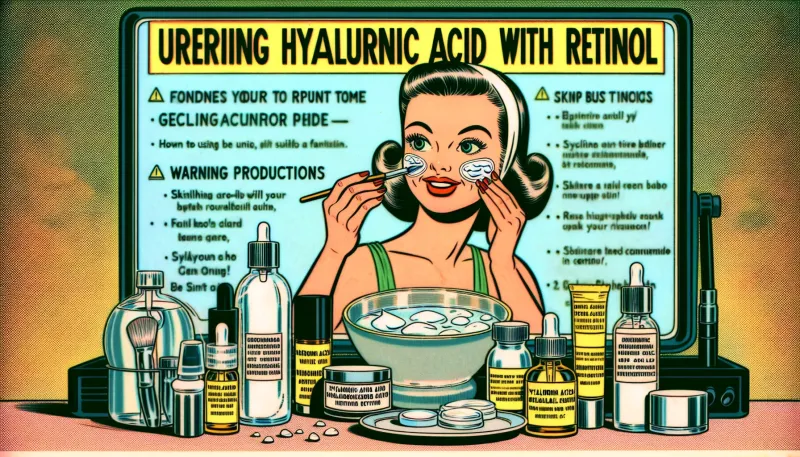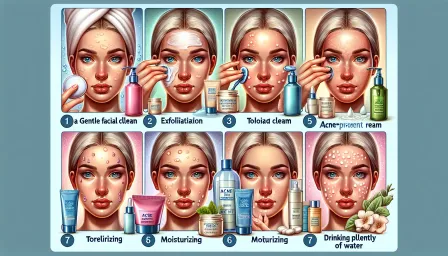Can You Use Hyaluronic Acid with Retinol? A Comprehensive Guide

Can you use hyaluronic acid with retinol? Explore our comprehensive guide that covers benefits, usage, potential risks, and tips for combining these skincare ingredients.
Combining skincare ingredients can seem daunting, especially when dealing with potent formulations. One of the most commonly asked questions is: Can you use hyaluronic acid with retinol? This comprehensive guide aims to address this question, offering a thorough understanding of both ingredients, their benefits, and the safest ways to incorporate them into your skincare routine.
Understanding Hyaluronic Acid
What is Hyaluronic Acid?
Hyaluronic acid is a naturally occurring substance in the human body, primarily found in connective tissues, skin, and eyes. It is well-known for its ability to retain moisture, making it a popular ingredient in many skincare products aimed at hydrating and plumping the skin. Hyaluronic acid can hold up to 1,000 times its weight in water, which is why it's highly effective in maintaining skin hydration levels.
Benefits of Hyaluronic Acid
- Hydration: Hyaluronic acid provides deep hydration, ensuring the skin stays moist and supple.
- Plumping Effect: By attracting and retaining water, it helps to reduce the appearance of fine lines and wrinkles.
- Enhanced Skin Barrier: It fortifies the skin's natural barrier, protecting against environmental aggressors.
Understanding Retinol
What is Retinol?
Retinol is a form of Vitamin A that is widely used in dermatology for its anti-aging properties. It works by accelerating cell turnover, promoting the production of new skin cells, and stimulating collagen production. This makes retinol highly effective in treating age spots, wrinkles, and acne.
Benefits of Retinol
- Anti-Aging: Retinol reduces fine lines and wrinkles by stimulating collagen production.
- Texture Improvement: It smooths out rough skin and minimizes pores.
- Acne Treatment: Retinol helps clear clogged pores and reduces oil production, making it an effective solution for acne-prone skin.
Can You Use Hyaluronic Acid with Retinol?
The answer is a resounding yes! Hyaluronic acid and retinol can be used together and actually complement each other quite well. Here’s why:
Why They Work Together
While retinol can be quite potent and sometimes irritating to the skin, hyaluronic acid provides the moisture and hydration the skin needs to counteract these potential side effects. This combination allows users to reap the benefits of retinol without compromising the skin's hydration balance.
When to Apply Them
- Layering Method: Start by applying a thin layer of hyaluronic acid immediately after cleansing. Allow it to fully absorb before applying retinol.
- Combination Products: Many skincare products now contain both hyaluronic acid and retinol, simplifying the application process.
Potential Risks and How to Mitigate Them
Irritation and Dryness
Retinol can cause irritation and dryness, particularly if you are new to using it. To mitigate these risks, introduce retinol slowly into your routine. Start with a lower concentration and gradually increase as your skin builds tolerance.
Sun Sensitivity
Retinol can make your skin more sensitive to the sun. Therefore, it's crucial to apply sunscreen every morning to protect your skin from UV rays.
Practical Tips for Combining Hyaluronic Acid and Retinol
Start Slowly
Introducing too many new products at once can confuse and irritate your skin. Start by using retinol once or twice a week and gradually increase the frequency as your skin adapts.
Hydration is Key
Since retinol can cause dryness, it's essential to keep your skin hydrated. Using hyaluronic acid before retinol can provide that needed moisture boost.
Consult a Dermatologist
If you have sensitive skin or are unsure about incorporating new products, consult a dermatologist. They can provide personalized advice tailored to your skin type and concerns.
Conclusion
Combining hyaluronic acid with retinol can provide excellent results for your skin, balancing the potent effects of retinol with the hydrating benefits of hyaluronic acid. By understanding how to use these ingredients effectively, you can achieve healthier, more youthful-looking skin. Always remember to start slowly, keep your skin hydrated, and consult a dermatologist if needed. Happy skincare journey!



























